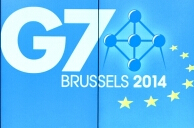G7 leaders to tackle Ukraine crisis without Putin
| Latest News |
G7 stops short of endorsing Japan's anti-China rhetoric
Leaders of the Group of Seven (G7) industrialized nations fell short of endorsing Japan's anti-China rhetoric at a meeting in Brussels on June 4.
G7 threatens to intensify sanctions on Russia over Ukraine crisis
Group of seven (G7) leaders on June 4 urged Russia to complete its troop withdrawal from the Ukrainian border, saying they stood ready to intensify targeted sanctions against Russia.
Analysts slam Japan's attempt to hijack G7
Analysts slammed Japan's efforts to produce a joint declaration condemning China's stance on the East China Sea and the South China Sea at the G7 summit, adding that such a move is fueled by Japan's own political agenda.
Russia absent for G7 Summit as Ukraine crisis set to dominate talks
Leaders of the G7 group of industrial nations have arrived in Brussels to begin a two-day summit. The meeting comes in the shadow of the crisis in Ukraine and it's the first time in 17 years that Russia won't be taking part.
| Basic Info |
 | Time: June 4-5 Location: Brussels, Belgium Topics: Ukraine crisis, Sanctions on Russia East and South China Sea issues, Energy security |
| Issues |
◆Ukraine crisis
G7 Brussels summit to focus on Ukraine situation, global economy
G7 to take three-stage path on Ukraine crisis: Merkel
◆Sanctions on Russia
EU calls upon Russia to deescalate situation in Ukraine
G7 threatens to intensify sanctions on Russia over Ukraine crisis
◆East and South China Sea issues
Leaders of the Group of Seven industrialised nations said on June 5 they were deeply concerned by tensions in the East and South China Sea, according to the Straits Times.
◆Energy security
Energy security at core of G7 meeting in Rome
| Comments |
Global Times
Qu Xing, director of the China Institute of International Studies
Even if the G7 does issue a declaration condemning China on the East China Sea and South China Sea issues, the influence will be very limited. The declaration will not change the situation in the South China Sea. Given the fact that it's no secret the West favors Japan, the criticism will very likely be seen as an unjust one.
Global bodies must represent new balance
Therefore, we should focus on the way international organizations are currently operating. As long as they are not representatives of the balance of power in today's world, the need for reforms will increase.
Xinhua News Agency
Abe's wishful anti-China thinking exposed at G7 summit
Given Japan's hawkish foreign policies and its unrepentant attitude towards history, it is delusional to think the G7, which consists of the United States, Canada, Britain, France, Germany, Italy and Japan, would take a unified anti-China stand.
Beijing Youth Daily
"Although tensions between US and Russia have increased over the Crimea issue, both sides have always stayed in communication," Sun Zhe, a professor of the Institute for International Studies at Tsinghua University, told Beijing Youth Daily on June 5.
Sun pointed out that US president Barack Obama is not adverse to meeting with Russian President Vladimir Putin, as both leaders will take part in the 70th anniversary of D-Day in Normandy, France on June 6. If the two happen to meet during the event, Sun predicts Obama will take the chance to dialogue with Putin.
"Apart from a few counties, such as Iran, the US has proven flexible in its diplomatic policy with other countries," said Sun.
| Background |
About Group of Seven (G7)
Members |
| US, Britain, Canada, France, Germany, Italy, Japan |
How is it formed? |
| In November 1975, in the wake of the worst global economic crisis since World War II, leaders of France, the United States, the then West Germany, Japan, Britain and Italy gathered in France for their first economic summit to discuss the global economic situation and coordinate policies to reinvigorate their economies. |
| The group of the six developed countries welcomed Canada as the club's seventh member at the second summit held in San Juan, capital of Puerto Rico in June 1976, thus G7 came into being. Since then, G7 members held the summit annually hosted by a rotating presidency. |
| In July 1991, former Soviet Union President Mikhail Gorbachev was invited to hold talks with the G7 leaders following the close of the summit in London. The participation on Russia's part continued in this way till Russia was finally granted the right to join discussions on political issues in 1994, forming the "7+1" mechanism. |
| The G7 summit became a G8 event in Denver of the United States in June 1997, when then Russian President Boris Yeltsin was invited to fully participate in the summit, and the final communique was issued in the name of the eight leaders for the first time, implying the G8's replacement of the "7+1" mechanism. |
| In the following year, Russia became an official member of G8. It gained the right in 2002 to host the 2006 summit. However, Russia's participation has long been limited to political issues and the G7 system remains in existence. |
| Russia is absent from the G7 summit in 2014 for the first time since it participated in G7 summit in 1997. |
Concerned Issues |
| Traditionally, the summit mainly concerned economic issues and the coordination of macroeconomic policies of member states. However, political issues were put on the agenda in the late 1980s. Discussions during the annual summit now cover economy, politics, security and poverty alleviation. |
| Source: Xinhua News Agency |
| Photos |
| Related News |
Western unity vowed over Ukraine
G7 leaders agree on new sanctions against Russia
Putin, Obama still in dialogue: Kremlin
Obama to meet Ukraine's president-elect in Poland: official
Japan seeks balance between Russia, US on Ukraine ahead of G7 meeting
Web editor: gelili@globaltimes.com.cn